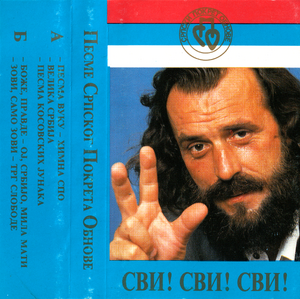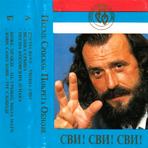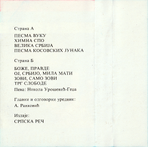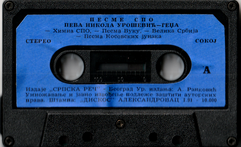Pesme Srpskog Pokreta Obnove
| Песме Српског Покрета Обнове | ||||
|---|---|---|---|---|
 | ||||
| Studio album by Никола Урошевић Геџа | ||||
| Released | 8 July 1991 | |||
| Genre | Novokompovana | |||
| Label | Српска реч | |||
| Никола Урошевић Геџа chronology | ||||
| ||||
Pesme Srpskog Pokreta Obnove (Serbian Cyrillic: Песме Српског Покрета Обнове, lit. "Serbian Renewal Movement Songs"), also known as Pesme SPO (Serbian Cyrillic: Песме СПО) and Himna SPO: Svi! Svi! Svi! (Serbian Cyrillic: Химна СПО: Сви! Сви! Сви!) is the tenth studio album by Nikola Urošević Gedža, released on the 8th of July 1991, by the publication Srpska reč.
Background
During the late 80's Yugoslavia would reinstate a multi-party system. In response, Vuk Drašković and Mirko Jović formed the Serbian National Renewal party (SNO) in 1989, though a year later Drašković left the SNO and formed the Serbian Renewal Movement (Srpski Pokret Obnove) with Vojislav Šešelj. This partnership would not last as Šešelj would leave the SPO and later formed the Serbian Radical Party (Srpska Radikalna Stranka).[1]
The party's leader, Vuk Drašković, advocated for the rehabilitation of the Chetniks, most notably general Draža Mihailović. Drašković and other associates of the party would write about the Chetniks in their early work and later articles criticizing political figures (and by extension, the Serbian government) in the publication, Srpski reč. In 1990, Drašković would publish an interview by Dražo's son, Branko Mihailović, who would subsequently become a member of the SPO as well as be a regular contributor of the publication in the early 90's. The SPO aided in erecting a monument of general Draža in 1992 and would go on to host annual gatherings at the monument on the 13th of May. The party's stamp had even resembled the coat of arms of the Ravna Gora movement at some point.[2]
During the Yugo Wars, SPO gained notoriety worldwide for their gathering at Trg Republike, rallying against Belgrade Television, the state-owned television channel on 9 March 1991 and Drašković's subsequent arrest.[3]
Release
Pesme Srpskog Pokreta Obnove was released on the 8th of July, 1991, by Srpska reč. Official advertisements in the 23rd issue of the publication promoted the album as Himna SPO: Svi! Svi! Svi! and the tape was circulated primarily by mail order.[4] In its initial and only-known run, about 10,000 copies were produced and was printed by Diskos. The only known variant of the cassette has a black matte shell with dark blue labels and with great audio quality.
Matching the theme of the SPO, most of the songs featured on the cassette are adaptations of Chetnik songs and were advertised as such. Although the performer, publisher, and A&R are credited, the songwriters and arrangers are anonymous. The album would be advertised from the 23rd issue onwards until the 32nd issue where merchandise of the SPO's paramilitary wing Srpska garda and commander Đorđe Božović Giška as well as other SPO merchandise would replace it. Ads for the album would still occasionally appear albeit hidden in advertisements for the SPO VHS, Kraj Aleksandar II Karađorđević u Srbiji until the 41st issue, giving the album about an eight-month run in the magazine.
Track listing
| No. | Title | Length |
|---|---|---|
| 1. | "Песма Вуку" | |
| 2. | "Химна СПО" | |
| 3. | "Велика Србија" | |
| 4. | "Песма косовски јунака" |
| No. | Title | Length |
|---|---|---|
| 1. | "Боже, правде" | |
| 2. | "Ој, Србијо, мила мати" | |
| 3. | "Зови, само зови" | |
| 4. | "Трг слободе" |
- The cassette labels have the first two tracks switched; the same as the track list advertised in the paper.
Personnel
Writing
- Никола Урошевић Геџа - Пева
Production
- А Ранковић - Главни и одговорни уредник
- СРПСКА РЕЧ - Издаје
- ДИСКОС - Штампа
Variants
- Excellent audio quality
- Black matte cassette, dark blue labels
References
- ↑ Mirjana R. Milenković. "Kako je Srpski pokret obnove, od stranke uragana, postao privezak na ključu SNS-a". Danas.rs. 1 September 2024. Archived from the original on 24 September 2024. Retrieved 24 September 2024.
- ↑ "Šta pogani od ljudi činite". Srpska reč . 21 June 1993. p.38. Retrieved 25 September 2024.
- ↑ Laura Silber, Allan Little. "If We Don't Know How to Work, At Least We Know How to Fight". The Death of Yugoslavia. Penguin Books. 1995. pp. 129-132. ISBN 0-14-024904-4. Retrieved 25 September 2024.
- ↑ "Zbog koga ginemo". Srpska reč. 8 July 1991. p. 4. Retrieved 25 September 2024.



